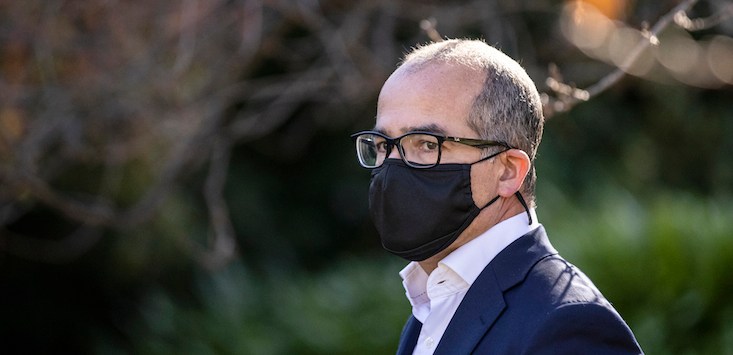
Acting Victorian Premier James Merlino. Source: AAP/Daniel Pockett
It’s unlikely the warring sides of the lockdown argument will ever agree on whether the benefit from lockdowns exceed the cost. But regardless of the political and health arguments, every founder should be taking a very close look at the marketing and PR masterclass that the Victorian government continues to display.
The lockdown playbook in Victoria has now been refined almost to an art form.
First, there’s the convenient leaking by insiders, a select group of mavens who act to shape the early public narrative. For each lockdown, I’ve been told almost exactly what would happen well before its public knowledge and our source has so far been 100% correct every time. Last Tuesday, before the Victorian government had publicly uttered the word lockdown, we were told one was coming.
In startup land, this is like a beta release to a very small group of engaged followers to get immediate feedback on how to shape your pre-release product.
Second, selected journalists get an exclusive drop, which comes with an implicit quid pro quo that a clear narrative should be pushed. In Victoria last week it was the super-contagious Indian mutant variant (note the intentional use of xenophobic language). Specific and friendly epidemiologists who have shown a strong preference for lockdowns (like Mike Toole or Adrian Esterman) are often called to add expert health views, whereas highly respected epidemiologists like Greg Dore, or microbiologists like Peter Collignon are never asked. This ensures the decision isn’t seen as political, but rather ‘scientific’ and ‘health based’.
Here the government is fully releasing a near complete product for mass consumption, alongside social proof and PR spin.
Then a press conference is held, alongside the daily case update to ensure maximum attention. Blame is cast on opposing politicians; last week, it was the federal government’s inept handling of vaccinations and South Australia’s quarantine failure. Any criticism of Victorian leadership is elegantly deflected as unfair attacks on hard working contact-tracers.
This is equivalent to a business achieving ‘product market fit’ and starting to ramp up paid advertising like Facebook or Google.
But imposing a lockdown is only half the challenge. The leadership then needs to ensure criticism is dulled.
This is where demographics play a big part, because the tiny benefits of a lockdown are spread across the entire population – that is, the reduced likelihood of catching COVID. By contrast, the majority of the costs of a lockdown are borne by a small minority, largely young casual workers (who are forced to somehow pay for rent and food without any income) and small businesses. Public servants, middle class employees and the wealthy generally cope just fine.
Here the government needs to accelerate growth and focus on the risks of the outbreak. Victoria’s CMO (technically chief medical officer but also performing the chief marketing officer role), the masterful Brett Sutton, this week introduced the concept of ‘stranger-to-stranger’ transmission, with a ‘super strain’ virus apparently moving “faster than any strain we’ve dealt with” (although actual case numbers are around a quarter of Sydney’s northern beaches outbreak in December). Peter Collignon, arguably Australia’s pre-eminent epidemiologist, observed “the language being used, with … a lack of evidence, is inducing a level of fear that is not warranted”.
Founders take note. The government is acutely aware of who its customers are — that is, the majority of voters in marginal seats. It understands deeply that a government’s primary role isn’t necessarily to undertake the most rational action, but rather, it’s north star is to win the next election (that may or may not be correlated with minimising the virus’ impact).
In that respect, the Victorian government understands its product (fear) and has done a spectacular job in selling it to its customer base (voters).
Whether or not you agree with the Victorian government’s is selling, they would make Sand Hill Road proud.
Handpicked for you

Melbourne lockdown extended for further seven days; millions more in business support announced



COMMENTS
SmartCompany is committed to hosting lively discussions. Help us keep the conversation useful, interesting and welcoming. We aim to publish comments quickly in the interest of promoting robust conversation, but we’re a small team and we deploy filters to protect against legal risk. Occasionally your comment may be held up while it is being reviewed, but we’re working as fast as we can to keep the conversation rolling.
The SmartCompany comment section is members-only content. Please subscribe to leave a comment.
The SmartCompany comment section is members-only content. Please login to leave a comment.